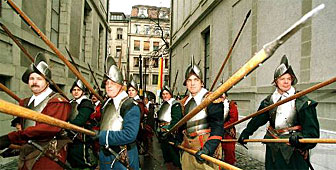The Escalade on the Wings of Time

An audacious open-air play puts a new spin on the defining moment in the Geneva's history.
The original play, On the Wings of Time, is the centrepiece of a year of celebrations marking the 400th anniversary of the Escalade, Geneva’s national holiday.
Billed as a “sound and light extravaganza”, it is a marriage of period costumes, classical music and state of the art technology.
“We celebrate the Escalade every year, but this is something really unique and extraordinary,” says Patrick Meyer, head of public relations for the 1602 Society, which organises the Escalade procession every year.
The Escalade celebrations commemorate the day – December 12, 1602 – when this fiercely independent Protestant state repelled the invasion force of the Catholic Duke of Savoy. The battle was little more than a skirmish, but it helped to define the city we know today.
Without this victory, it is said, Geneva would today be a provincial French town and not the humanitarian capital of the world.
Symbolic setting
The play – which features 300 actors and extras, 15 horses and a host of other farmyard animals – is being staged every night from August 14 to 23 in the atmospheric and symbolic setting of the Parc des Bastions, in front of the city’s giant monument to Calvinism, the Reformation Wall – where the events in question actually took place.
“It would have been difficult to stage it anywhere else in Geneva,” says director, Jean-Pierre Anchisi.
The play is in French, but the sizeable English-speaking community in Geneva need not feel left out. There will be headphones available offering a simultaneous translation, voiced by English actors.
Challenging myths
This year, the celebrations are not confined to December. To mark the 400th anniversary, a series of events are being staged throughout the year.
On the Wings of Time does not only concentrate on the events of December 1602. It begins in 1533, and traces the rise of Calvinism in the city. It ends in 1603, when the Treaty of St Julien was signed, guaranteeing Geneva its independence and bringing relative peace to a region wracked by religious strife.
“This is not a history lesson. Above all, we’re putting on a show. We want to elicit an emotional response,” Anchisi says. Even so, he acknowledges that he felt it important to challenge the myths that surround the Escalade story.
“Many Genevese don’t really know what happened,” he told swissinfo. “They have their symbols, but they don’t know what factors led up to the night of the Escalade, nor what happened afterwards.”
The Duke of Savoy is traditionally painted as a villain, but Anchisi says that he was little more than a pawn, doing the bidding of the Pope and the King of Spain.
Historical context
The action on stage is punctuated by appearances by a replica of Leonardo da Vinci’s famous flying machine, which helps to put these events in a wider historical context.
Aside from this historical aspect, Anchisi says the play has a strong humanist message. It shows how the ordinary people of Geneva and of the nearby French town of Thonon helped each other when they were hit by the Plague.
It also reveals how Geneva was an international city 400 years ago, welcoming persecuted Protestants from all over Europe.
“It’s very moving to see these people from Geneva playing the parts of these refugees – and those refugees could have easily been their ancestors,” Anchisi says.
by Roy Probert
Geneva is this year marking the 400th anniversary of the Escalade – a day when the protestant state repelled the invasion force of the Catholic Duke of Savoy. The battle was little more than a skirmish, but without this victory, it is said, Geneva would today be a provincial French town and not the humanitarian capital of the world. The centrepiece of the celebrations is a play “On the Wings of Time”, which traces the rise of Calvinism in the city ending in 1603, when the Treaty of St Julien was signed, guaranteeing Geneva its independence and bringing relative peace to a region wracked by religious strife.

In compliance with the JTI standards
More: SWI swissinfo.ch certified by the Journalism Trust Initiative









You can find an overview of ongoing debates with our journalists here . Please join us!
If you want to start a conversation about a topic raised in this article or want to report factual errors, email us at english@swissinfo.ch.